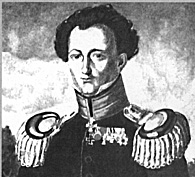
 Carl von Clausewitz, an eyewitness to the unfortunate campaign in 1806, described the sorry condition of Prussian command and control. He noted that many members of the Prussian staff spent much of the time debating the directives of their commander in furtherance of their own personal desires, as opposed to seeing that his wishes were swiftly carried out. Thus, at Auerstadt (14 October 1806), the commitment of General Kalkreuth's two reserve divisions could have sent French Marshal Davout reeling in defeat. Instead, the Prussian staff hindered King Frederick William's crucial decision though incessant bickering until it was too late.
Carl von Clausewitz, an eyewitness to the unfortunate campaign in 1806, described the sorry condition of Prussian command and control. He noted that many members of the Prussian staff spent much of the time debating the directives of their commander in furtherance of their own personal desires, as opposed to seeing that his wishes were swiftly carried out. Thus, at Auerstadt (14 October 1806), the commitment of General Kalkreuth's two reserve divisions could have sent French Marshal Davout reeling in defeat. Instead, the Prussian staff hindered King Frederick William's crucial decision though incessant bickering until it was too late.
As Clausewitz commented, "It's for this reason why advice and conversations at moments when great decisions are required are always very undesirable." The staff, implied Clausewitz, was to support the commander's decisions, not critique them, and here Prussia's ad hoc organization failed miserably. Modern analysts on the subject agree, Niel M. Heyman in Military Affairs writing, "It was kind of command by Sanhedrin [the Supreme Council of the Jews in New Testament times], by its very nature incapable of rapid decision-making, not to speak of being able o alter decisions efficiently to fit a shifting military situation."
Back to Table of Contents -- Napoleon #1
Copyright 1995 by Emperor's Press.